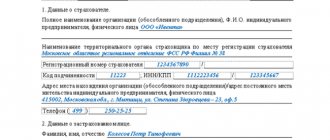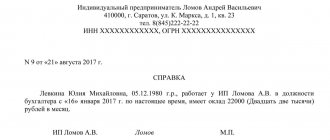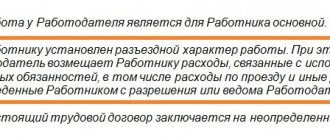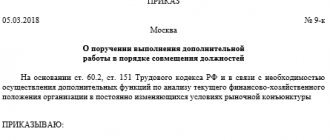External and internal part-time work: what is the difference
If an employee decides to take a second job in order to obtain an additional source of income, he may have several alternatives:
- First, you should ask your main employer if the company has any vacant positions available on a part-time basis. If there is one, the employee can take this position in addition to his main job. This option is called internal part-time work (Article 60.1 of the Labor Code of the Russian Federation).
Note! Internal part-time work must be distinguished from the concept of “internal combination of positions” (in one organization).
For more information about the difference between these concepts, as well as combining positions, see the article “Registration of combining positions in one organization.”
- If it is not possible to find a second source of income at the main place of work, the employee has the right to additionally get a job in another company, retaining his previous place of work as his main one. This option is defined in the Labor Code of the Russian Federation as external part-time work (Article 60.1 of the Labor Code of the Russian Federation).
The nuances of registering an external part-time job were explained by ConsultantPlus experts. Get free demo access to K+ and go to the HR Guide to find out all the details of this procedure.
However, regardless of which company (your own or a third party) the employee will be listed as a part-time worker, one general rule must be observed: part-time work should be performed by the employee only during those hours that, by virtue of the Labor Code of the Russian Federation (and the employment contract), should not be be assigned to perform functions at the main place of work (Article 60.1 of the Labor Code of the Russian Federation).
Important! The Labor Code of the Russian Federation does not contain any restrictions regarding the maximum number of positions an employee can simultaneously hold. On the contrary, the code establishes that a specialist can have as many additional jobs as he likes (Article 282 of the Labor Code of the Russian Federation).
NTVP "Kedr - Consultant"
LLC "NTVP "Kedr - Consultant" » Services » Legal consultations » Labor disputes » Is it possible to transfer an employee from his main place of work to an external part-time job without dismissal?
Question. Is it possible to transfer an employee from his main place of work to an external part-time job without dismissal?
Answer.
In this case, it is necessary to dismiss the employee and issue him a work book, which must be located at his main place of work. The transfer of an employee does not provide for the issuance of a work book. After dismissal from your main place of work, you have the right to accept this person as an external part-time worker.
By virtue of Art. 60.1 of the Labor Code of the Russian Federation, an employee has the right to enter into employment contracts to perform other regular paid work with the same employer (internal part-time job) and (or) with another employer (external part-time job) during his free time from his main job.
Based on the definition of part-time work given in Part 1 of Art. 282 of the Labor Code of the Russian Federation, part-time work is work under another employment contract in free time from the main job.
By virtue of Part 4 of Art. 282 of the Labor Code of the Russian Federation, the employment contract must indicate that the work is part-time.
By virtue of Art. 66 of the Labor Code of the Russian Federation, a work book of the established form is the main document on the employee’s work activity and length of service.
The employer (with the exception of employers - individuals who are not individual entrepreneurs) maintains work books for each employee who has worked for him for more than five days, in the case where work for this employer is the main one for the employee.
The work book contains information about the employee, the work he performs, transfers to another permanent job and the dismissal of the employee, as well as the grounds for termination of the employment contract and information about awards for success in work. Information about penalties is not entered into the work book, except in cases where the disciplinary sanction is dismissal.
At the request of the employee, information about part-time work is entered into the work book at the place of main work on the basis of a document confirming part-time work.
{Question: Is it possible to transfer the main employee to a part-time job with the same employer by concluding an additional agreement to the employment contract (i.e. without dismissing the employee and then hiring him to work part-time)? If this is possible, what is the procedure for maintaining an employee’s work record? (“Website “Onlineinspection.RF”, 2020) {ConsultantPlus}}
The explanation was given by Igor Borisovich Makshakov, legal consultant of LLC NTVP Kedr-Consultant, February 2020.
When preparing the answer, SPS ConsultantPlus was used
This clarification is not official and does not entail legal consequences; it is provided in accordance with the Regulations of the CONSULTATION LINE (www.ntvpkedr.ru).
Restrictions on external combination work
At the same time, not all specialists can work part-time somewhere else in addition to their main job.
Restrictions on this are established by Art. 282 of the Labor Code of the Russian Federation, as well as special industry legislation.
In particular, the Labor Code of the Russian Federation prohibits taking on a part-time basis:
- for work that involves hazardous working conditions, specialists who work in the same conditions in their main position;
- minors (Article 282 of the Labor Code of the Russian Federation);
- for the position of driver, driver, pilot or other person whose work is related to driving vehicles, a specialist who performs similar duties at the main place of work (Article 329 of the Labor Code of the Russian Federation).
A specific list of positions for which registration for part-time work is prohibited is given in Decree of the Government of the Russian Federation dated January 19, 2008 No. 16.
In addition to these categories of citizens, restrictions on part-time work apply to persons working in the state apparatus:
- state and municipal employees;
- members of the Government of the Russian Federation;
- judges;
- heads of state universities, schools, colleges and other educational organizations established by the state.
Employees of security structures cannot combine their main job with another:
- military personnel, including employees of intelligence agencies (SVR) and the FSB;
- police officers.
In addition, the ban on part-time work applies to bank employees holding certain positions. Some restrictions also apply to teachers, doctors, pharmacists, and cultural workers.
The company should look for specific restrictions in relation to these categories of citizens in special industry legislation (for example, for police officers - in paragraph 4 of Article 34 of the Federal Law “On Service in the Department of Internal Affairs of the Russian Federation” dated November 30, 2011 No. 342-FZ).
Important! If a company nevertheless decides to hire a part-time person for whom the legislator has established a corresponding prohibition (restriction), it is important to understand that the company is subject to administrative liability for this in accordance with Art. 5.27 Code of Administrative Offenses of the Russian Federation. And an employment contract with a part-time worker, in turn, may be declared invalid (clause 11, part 1, article 77 of the Labor Code of the Russian Federation).
It should be noted that labor legislation does not oblige a potential part-time worker to submit, when applying for a part-time job, a document confirming the absence of any restrictions on combination work in relation to him. In this regard, the question is relevant for many organizations: what should be done to protect themselves as much as possible when hiring a part-time worker?
The best option is to ask the potential part-time partner for such information (for example, about the main position held and the nature of the work) in free form. If there are no restrictions, it will be easy for the applicant to provide such information so that the company decides to hire him. If he refuses to provide such information, nothing prevents the company from finding another candidate, because the risk of a fine under Art. 5.27 of the Code of Administrative Offenses of the Russian Federation remains valid even in the case where the company allegedly did not know about the existence of restrictions.
Legislative norms
The Labor Code of the Russian Federation is the main legislative act in the relevant area of law. It establishes requirements for drawing up an employment contract, discipline rules and regulations, the rights and obligations of the parties, and regulates other aspects of interaction between employees and employers, including part-time work.
The legislation gives a definition and also highlights the features characteristic of this mode of activity. True, not a single document describes the transfer from the main job to a part-time job in the form of a clear process with requirements for what needs to be done and how.
Therefore, each employer, or more precisely, personnel service employees, must independently develop instructions on how to transfer an employee from his main place of work to a part-time job. Naturally, in this case, it is mandatory to comply with all legal norms, so that in the event of inspections, you do not have to blush and look for answers to uncomfortable questions from auditors.
Registration of external part-time work - what documents are needed when applying for a job
So, how to arrange a part-time job for a specialist needed by the company? To do this, the company must conclude a separate employment contract with him (Article 282 of the Labor Code of the Russian Federation). The specific requirements for the content of such an agreement are basically similar to the requirements for a regular, standard employment contract. It requires:
- register the position of a part-time specialist, the responsibilities that will be included in his functionality;
- establish the procedure and amount of remuneration for his work;
- indicate the time during which the employee will perform the functions of a part-time worker.
Important! In addition, it is important for the company not to forget to indicate in the employment contract that the work will be performed by a specialist on a part-time basis (a direct requirement of Article 282 of the Labor Code of the Russian Federation).
In addition, the organization has the right to conclude an employment contract for external part-time work either for a certain period of time or without a time frame (Article 59 of the Labor Code of the Russian Federation). So if a company hires a part-time worker only before the expiration of a certain period, this period must be specified in the employment contract.
The list of documents with which the candidate must come for registration generally corresponds to the list required when applying for the main place of work:
- passport;
- education document;
- insurance certificate;
- registration certificate/military ID.
Is it necessary to fill out a paper work book for a part-time worker, and what to do with an electronic work book, ConsultantPlus experts told. Study the material by getting trial access to the K+ system for free.
However, there are some additions. So, if a candidate gets a job with hazardous working conditions, he must provide information about his main job so that the 2nd employer can make sure that the candidate does not fall under the above restrictions under Art. 282 Labor Code of the Russian Federation.
An important issue concerns the termination of the work of a part-time worker at an enterprise. As under a standard employment contract, relations with a part-time worker can be terminated at the initiative of one of the parties, by agreement and other grounds provided for in Art. 77 Labor Code of the Russian Federation.
But there is a nuance here: the company has the right to terminate the powers of a part-time worker if it has found another candidate in his place who intends to occupy this position as his main job (Article 288 of the Labor Code of the Russian Federation). In this case, the company should notify the part-time employee in writing of the termination of cooperation with him no later than 2 weeks before dismissal.
How to properly arrange a transfer from main employees to part-time employees?
Hello, Yana! In accordance with Art. 282 of the Labor Code of the Russian Federation, part-time work is the performance by an employee/employee of other regular paid work under the terms of an employment contract (hereinafter abbreviated as “TD”) in his free time from his main job. Please take into account that the current legislation does not regulate the procedure for transferring the main employee/employee to part-time work. But, based on professional experience, I dare to recommend the following options: A. - Internal transfer of an employee/employee from one employer. According to Art. 77 of the Labor Code of the Russian Federation, the translation must be formalized by an agreement of the same name, which is concluded in writing. It turns out that, in essence, a transfer from the main place of work to a part-time job is a change in the terms of the TD defined by the parties. And when resigning from their main place of work, an employee/employee can and has the right to submit an application to the manager for his transfer to a vacant position on a part-time basis. After this, the employer enters into an additional agreement with such employee/employee. agreement to the TD, which defines new terms of remuneration and a new working hours, but (!!!) do not terminate the original TD. Although there is a weak link in this option, and it is associated with the requirements of the Instructions for filling out work books (hereinafter referred to as “Instructions”), according to which, entry into the work book (hereinafter abbreviated as “TK”) information about part-time work is carried out at the request of the employee/employee at the place of main work and in accordance with the Instructions, in case of transfer of the employee/employee, the Labor Code must contain records of previous and new places of work. After all, according to the requirements of the current legislation, it is impossible to transfer an employee/employee from one place of work to another if the Labor Code does not contain the relevant information about these works. B. - Terminate the TD for the main job (by agreement of the parties or on the initiative of the employee/employee) and accept the dismissed person for a part-time job through issuing an appropriate order and concluding a new TD, which will indicate that this work is part-time. It should be remembered that when an employee/employee is hired on a part-time basis, the contract of agreement with him/her is concluded in accordance with the general procedure. The only difference is that a person who is accepted as a part-time worker is not required to provide the future employer with a labor commission, military registration documents, as well as an insurance certificate of state pension insurance. This is precisely the option for registering the transfer of the main employee/employees to part-time workers that is usually practiced by employers.
What rate can you apply for when working part-time?
Labor legislation establishes one significant limitation regarding how much time an employee is entitled to spend on part-time work. Namely: he can be entrusted with work that takes no more than 4 hours per day (Article 284 of the Labor Code of the Russian Federation).
However, if on some day an employee is not busy at his main job, he has the right to work part-time all day. The main thing is that in a month he does not work more than half of the monthly norm that the legislator has provided for the corresponding category of workers.
In addition, there are other cases when a part-time worker can work more than 4 hours a day.
Read more about this in the article “Part-time work - how many hours per week?”
Thus, in general, part-timers are attracted only at 0.5 bets, which means they receive an appropriate reward. How to calculate the specific amount of such remuneration?
Translation is not possible
Let us say right away that the Labor Code does not provide for the transfer of the main employee to a part-time position. Therefore, the transition from the main job to a part-time job within the organization is illegal.
Part-time work is a phenomenon when an employee, in his free time from his main job, works under a separate employment contract. With external part-time work, the employee has different employers, while with internal part-time work, the employer is the same. It is important to understand that part-time work is necessarily work under a separate employment contract. Civil legal relations with organizations and individual entrepreneurs are not part-time work.
As a general rule, a part-time worker cannot work more than four hours a day. Only when he is free from his main job can he devote a whole working day to part-time work. However, in any case, at the end of the accounting period, the time worked by a part-time worker cannot exceed half of the working time for the accounting period for this category of employees.
How is an external part-time worker paid?
Art. 285 of the Labor Code of the Russian Federation defines the following payment options for external part-time work:
- for hours actually spent on work, based on the hourly rate;
- for the amount of work actually performed;
- on any other terms based on the provisions of the employment contract.
The salary of a part-time worker, like any other employee, must be paid twice a month (Article 136 of the Labor Code of the Russian Federation).
In addition, the company should remember that part-time workers are entitled to leave of at least 28 days (Articles 114, 115 of the Labor Code of the Russian Federation). Moreover, the employee must receive such leave at the same time as he rests at his main place of work (Article 286 of the Labor Code of the Russian Federation).
Part-time employees should also know that they have the right to count on receiving all the guarantees and compensation due to them not only at their main place of work, but also at part-time work, with the exception of guarantees for those combining work with study and workers in the Far North (Article 287 of the Labor Code RF).
In particular, for guarantees for pregnant women who are part-time workers, see the article “Maternity benefits for part-time workers.”
Who should not be a part-time worker?
It is important to know that not everyone is allowed to work part-time, for example, it cannot be used by employees who have not reached their 18th birthday (Article 282 of the Labor Code of the Russian Federation), employees with harmful or dangerous working conditions, if in the second place of work (at a part-time job) they similar.
Lawyers cannot be part-time . And trainers must coordinate part-time work (if it is also related to teaching, conducting training) with the employer at the main place of work (Article 348.7 of the Labor Code of the Russian Federation).
In Art. 329 of the Labor Code of the Russian Federation states that part-time work related to driving vehicles or controlling the movement of vehicles is not allowed for those employees who perform similar work for the main employer.
Results
External part-time work is a common option through which a specialist gets the opportunity to work in several jobs at once. For a company that hires a candidate on an external part-time basis, it is important to know that hiring such a specialist must be formalized through a separate employment contract. To complete it, the candidate must bring a standard package of documents, with the exception of the work book.
The company can determine the workload of a part-time worker for no more than 4 hours a day. At the same time, his salary and vacation pay must be transferred according to the same rules as for main employees.
The employee must understand that if the 2nd employer finds a replacement specialist who agrees to occupy the position as his main job, the position will have to be left due to the requirements of the Labor Code of the Russian Federation.
You can find more complete information on the topic in ConsultantPlus. Free trial access to the system for 2 days.
Registration of a transfer in the order of “dismissal-reception” of an employee
When using this method, first of all, it is necessary to terminate the employment contract with the employee who is currently an external part-time worker. The basis for termination of the contract may be the initiative of the employee, mutual agreement of the parties, or a special basis for part-time workers, provided for in Art. 288 Labor Code of the Russian Federation. After which a new employment contract for the main place of work is concluded with the employee.
The algorithm of actions when using this method should be as follows:
- Issuing an order to dismiss an employee;
- Reflection of the dismissal record in the work book;
- Conclusion of a new employment contract reflecting the hiring of the employee to the main place of work;
- Reflection of an appointment record in the employee’s work book.
Transfer of an external part-time worker to the main place of work without termination of the employment contract
This method is the most convenient for the employer, since when using it there is no obligation to terminate the employment contract and make final payments to the employee upon dismissal. But on the part of the employee there are also positive features of using this method, for example, he retains the accumulated vacation days, there is no obligation to go through a probationary period in the company again.
The procedure for transferring an external part-time worker to the main place of work when using the second option will include the following procedure:
- Making changes to the employment contract by concluding an additional agreement to it, which will stipulate that the employee is transferred from an external part-time job to the main place of work;
- Making an additional entry in the employee’s work book. If there is a record of part-time work, then in the second column it is necessary to additionally indicate from what period the employee begins his main job. In the third column “Information on hiring, transfer to another permanent job, qualifications, dismissal,” the employer must indicate that the part-time position has become the main one for this employee. If initially there was no record of external part-time work, it should be made before reflecting the transfer to the main place of work.









